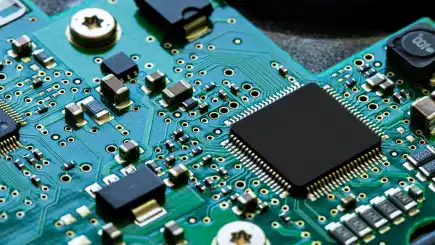Learn circuits with online courses and programs
What are circuits?
Circuits are pathways that allow the flow of electrical current to power and control electronic components. They can range from basic configurations found in everyday gadgets like flashlights to complex integrated circuits used in advanced technology, such as the microprocessors in computers.
There are several kinds of circuits, each used for different applications. Some examples include:Footnote 1
Digital circuits use binary signals, 0s and 1s, to process and store information. They form the basis of computer systems and digital devices.
Analog circuits use continuous, varying signals, representing physical quantities such as voltage or current. They are used for audio amplifiers.
The circuit industry encompasses the design, manufacturing, and integration of circuits for sectors such as telecommunications, computing, automotive, and renewable energy. It plays a vital role in powering and controlling modern technology.
Browse online circuits courses
Circuits course curriculum
An introductory course in circuits and electronics could be a good way for learners to begin studying the subjects. Some topics covered could include:
Calculating voltage, current, and power
Understanding circuit analysis methods
Using electrical measurement equipment
Using resistors, capacitors, inductors, diodes
Start building the knowledge you need to work with circuits using edX. From accelerated boot camps to comprehensive programs that allow you to earn a bachelor’s degree or (for more advanced learners) a master’s degree, there are many different learning formats available to fit your needs. Busy professionals can even take advantage of executive education courses tailored to those in leadership and management positions. Find the right course for you.
Explore jobs related to circuits
The circuit industry needs skilled professionals who can design, analyze, and optimize circuits to ensure their efficiency, reliability, and safety. With ongoing advancements in technology, pursuing a career in the circuit industry offers exciting opportunities to contribute to innovation and shape the future of electronic devices and systems. Some examples of jobs include:
Electrical engineer: Designs, develops, and tests electrical circuits for a wide range of applications, such as power systems and electronic devices.
Circuit design engineer: Creates and optimizes circuit layouts, selects components, and ensures functionality, reliability, and performance of electronic circuits.
Electronics technician: Assembles, troubleshoots, and repairs circuit boards and electronic systems, ensuring proper functioning and identifying and resolving issues.
Semiconductor engineer: Works on the design, fabrication, and testing of semiconductor devices and integrated circuits, contributing to advancements in microelectronics.
Each of these roles will have different education and skills requirements. Some employers may seek candidates with a degree in engineering depending on the role. Before deciding on a specific learning path, research the positions you hope to pursue and align your coursework with your career goals.

